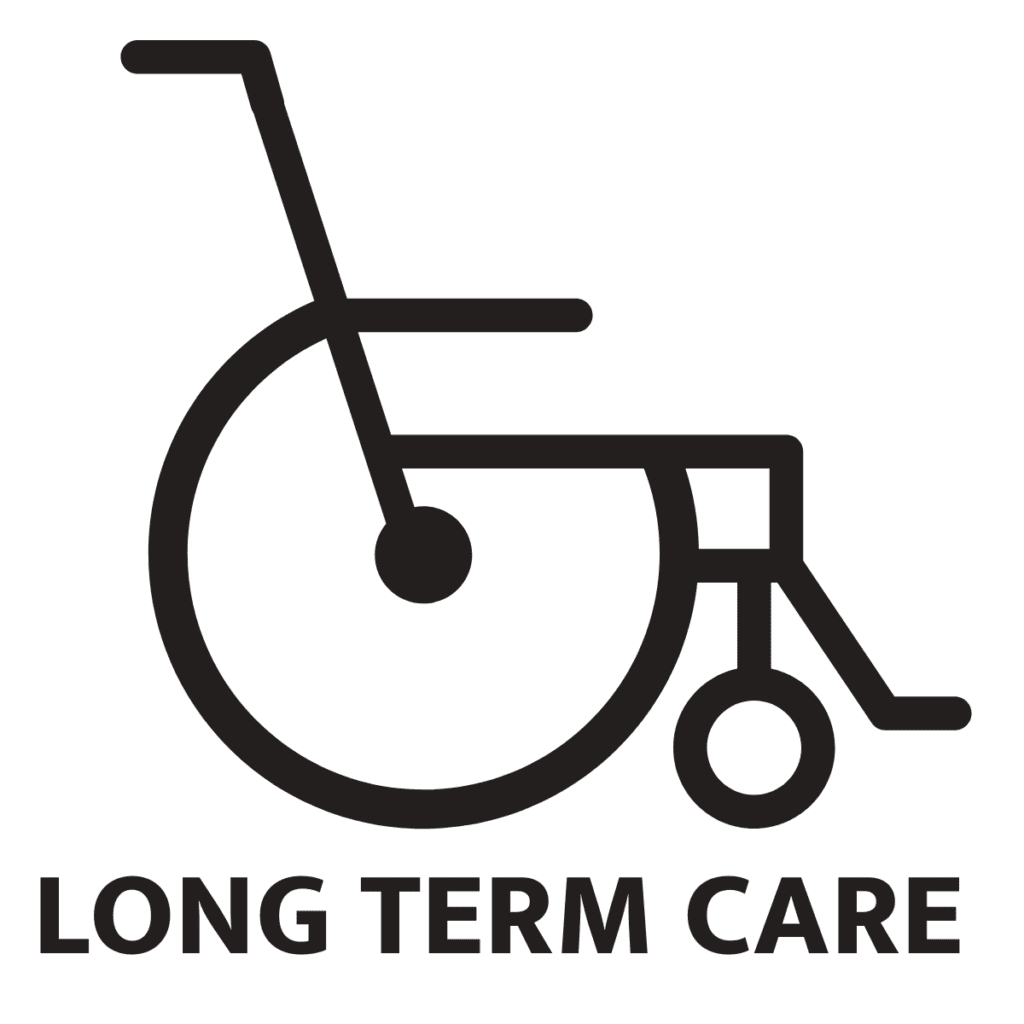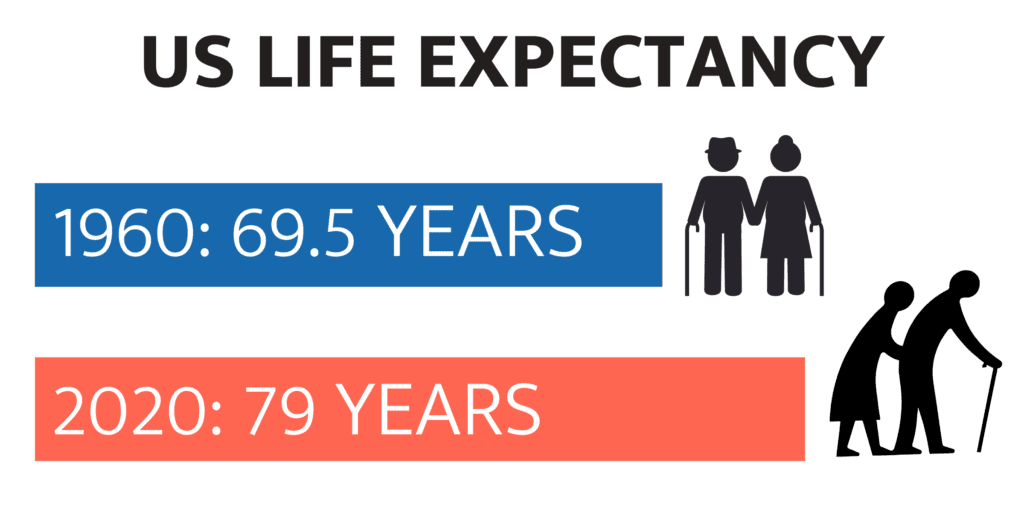
Over the last 50 years, western lifespans have increased to the tune of almost a decade. While women tend to live a handful of years longer than men, most industrialized nations now see both men and women living close to or above 80 years on average. As each generation gets slightly larger, this means that an ever-increasing number of individuals are living well past retirement age, oftentimes for decades.
As individuals age, the likelihood that they will be able to fully take care of themselves diminishes. If you’ve watched family members of friends age, chances are at least some of them are in assisted living facilities, elder care facilities, or at the very least take advantage of long-term health care at home.
While individuals have tended to live longer and longer lives thanks to medical advances, there’s a crucial concept that’s at the heart of long term care that needs to be considered:
Namely, a long life does not equal a high quality of living.
It’s here that top-notch long term care medical professionals and administrators can make a huge difference. Many individuals in long term care settings can’t take their care fully into their own hands. They rely on skilled, compassionate, and knowledgeable medical and management professionals to keep their life progressing happily.

Keep in mind that long term care isn’t just in relation to the elderly. Individuals with a range of mention, emotional, and physical disabilities, as well as individuals recovering from traumatic injuries, are often cared for in long-term settings.
Here at BestHealthDegrees, we’ve helped thousands of individuals to find meaningful, lucrative, and rewarding health careers. And we can tell you from experience that for the right type of applicant, long term medical care is an amazing career choice.
We’ll cover a number of topics in this guide as noted below.
In This Guide:
- What is a long term medical care degree?
- Can I get a long term medical care degree online?
- Long term medical care degree or another degree?
- What can I do with a long term medical care degree?
What is a long term medical care degree?
Long term medical care degrees typically fall into three categories:
- Low-to-mid-level nursing degrees that can lead to employment in long term care facilities (as well as elsewhere)
- Specialized nursing or medicine degrees in gerontology or related disciplines
- And health care management or administration degrees geared toward gerontology or long-term care settings
We’ll work through all of the options above, starting with degrees that are available at the associates level and progressing through professional and doctoral programs.
Associates degrees for long term care
Associates degrees in nursing (ADN) degrees are two-year degrees that can prepare you to take the registered nursing (RN) professional exam.
Almost all long-term care facilities employ registered nurses to implement long term care solutions for their patients (or residents).
Associates degrees in nursing are essentially the first two years of BSN school, and there are many programs available that allow students to progress from an RN to a BSN later in their career if they so choose.
Prerequisites for an associates degree in nursing include general education requirements such as:
- A class in natural sciences
- A class in social sciences
- A class in college-level mathematics
- A class in communications, literature, or speech
- A physical education class
- A fine arts class
- And so forth
Additionally, most programs require some more specialized course work within the natural sciences before you can jump into coursework. These courses typically include:
- Anatomy and Physiology
- Microbiology
- Chemistry
- And Statistics
Once you’ve taken the prerequisites, the major coursework for an ADN degree can go by quite quickly. While coursework varies depending on the program you’re in, you’re likely to take courses similar to the following:
- Nursing Foundations
- Behavioral Health
- Basic College-Level Pharmacology
- Care for Adults In Nursing
- Child Nursing and Maternal Care
Students will also be expected to complete some in-person supervised “hours” of work before gaining full licensure to practice as a registered nurse.
A second associates-level degree that can lead to employment within long term care settings is that of a physical therapy assistant (APT) degree.
Many individuals living in long term care settings have physical issues that prohibit them from living alone. These are often mobility issues. Additionally, many individuals temporarily placed into long term care settings are recovering from traumatic accidents such as car wrecks.

Physical therapy assistant degrees help with the application of physical therapy among patients or residents of long-term care facilities.
Physical therapy assistant degrees are similar to associate of science in nursing degrees. Prerequisites include general education requirements such as:
- A class in natural sciences
- A class in social sciences
- A class in college-level mathematics
- A class in communications, literature, or speech
- A physical education class
- A fine arts class
- And so forth
Additionally, students should expect to take prerequisite courses in:
- Anatomy and physiology
- Biology
- Physics
- Chemistry
- Psychology
- And Statistics
Within the major course of study, students should expect to spend about 75% of their time taking courses that are in the classroom, and about 25% of their time gaining hands-on experience.
Major courses for physical therapy assistants typically includes:
- Biomechanics
- Kinesiology
- Neuroscience
- Clinical Pathology
- Behavioral Science
- Communications
- Exercise Physiology
- And Ethics
One final option related to physical therapy assistant though not requiring specific coursework in physical therapy is that of physical therapy aide. The chief different between physical therapy assistants and aides is that aides typically gain experience on the job instead of in the classroom, and typically will not handle as much responsibility as their degreed counterparts.
Bachelors degrees for long term care
At the bachelor’s level, individuals can major in disciplines focusing on both direct medical and therapeutic care for long term care residents as well as disciplines tasked with the management or business side of long term care.

Bachelor of science in nursing (BSN) degrees are the gold standard for registered nursing (RN) work, and tend to provide higher levels of pay and responsibility compared to RNs with an associates degree in nursing.
Bachelor of science in nursing degrees may lead to leadership positions within some long term care facilities. In facilities that are for lower medical risk residents, a single on-call RN may be the primary point of medical contact.
Bachelor of science in nursing degrees typically require roughly the same science and math prerequisites that are needed to attend medical school. Beyond general education requirements required of all students at the bachelor’s level, BSN students are expected to take the following courses:
- Microbiology
- Statistics
- Chemistry
- Physics
- Anatomy and Physiology
Within the major, bachelor of science in nursing students are likely to take at least some courses on all of the following subjects:
- Theory of Nursing
- Ethics
- Emergency Care
- Pharmacology
- Adult Nursing
- Pediatric Nursing
- Geriatric Nursing
- Research in Nursing
- Psychology
- Nutrition and Diet
- Bedside Manner
- Among others
As with associate of science in nursing degrees, students are expected to spend close to 25% of their time studying nursing-specific material in a hands-on manner, often referred to as getting one’s “supervised hours.” At the end of a course of study, individuals who have not already gained an RN licensure often pursue their RN licensure exam.
A second group of bachelor’s degree programs that may prepare you to work in a long term care setting can be endeavored upon with a bachelor’s degree in pre-physical therapy settings.
While full physical therapist positions require a master’s degree, students may prepare themselves to be competitive applicants for physical therapist programs with a degree in pre-physical therapy. Additionally, students may choose to work as a physical therapy assistant with a pre-physical therapy degree.
Students within pre-physical therapy programs typically won’t endeavor upon as much hands-on experiential learning as in an associates degree for physical therapy assistants. Rather, pre-physical therapy programs endeavor to provide a rigorous scientific basis for endeavoring upon physical therapy at graduate levels.
Major courses within a pre-physical therapy major typically include the following:
- Anatomy
- Physiology
- Physics I and II
- Chemistry I and II
- Biology I and II
- Psychology
- Statistics
Potential pre-physical therapy students should also note that there are related degrees which may also prepare them for employment in long term care settings. These include degrees in:
- Occupational Therapy
- Kinesiology
- Psychology
- Special Education
- And nursing education
Finally, on the business and administration side of bachelor’s level degrees that can prepare one for a career in a long term care medical setting there are bachelors in health care administration and management.
Typically bachelors in health care administration and management avoid natural science-heavy disciplines, and rather spend time on dealing with managerial and applied issues as health care exists in the real world.
Beyond general education requirements required of all bachelor’s students, students within bachelors in health care administration degrees are likely to take the following courses:
- Economics of health care systems
- Management in health care settings
- Information technology for health care
- Health law
- Ethics in health care settings
- Health care organizations
- American health care
- Insurance in America
- Services for the mentally ill
- Services for the elderly
- Administration of hospitals
- Managed care
- International health care
Many students may also find that they are qualified for managerial or business-side positions within long term care facilities with related degrees in management or business.
Masters degrees for long term care
At the master’s level, students can begin to pursue degrees that will prepare them as the primary facilitators of health care and therapy for long term care populations. A similar program that may be a good fit for individuals is a Master’s in Healthcare Administration degree.
Degrees at the master’s level can prepare individuals to work in:
- Specialized nursing roles
- Nurse practitioner roles
- Occupational therapy roles
- Psychologist roles
- Senior business management roles
While we won’t focus on all of the above roles in this guide, be sure to explore our related in-depth guides on all of the above disciplines at BestHealthDegrees.

First we’ll look at master’s degrees for specialized nursing roles. While there are many nursing roles that may interface with long term care communities, one of the most tailored to long term care facilities is that of a geriatric nurse.
Geriatric nursing positions are technically available with just an associates or bachelor’s degree. You’ll need to hold your RN designation. You’ll also need to have practiced within a nursing environment that deals primarily with geriatric patients for at least two years.
One reason we’ve placed geriatric nursing licensure within our master’s degree area is that individuals are required to have completed 30 credit hours of continuing education credits within geriatric nursing beyond the bachelor’s level. While you don’t technically need a master’s degree, you will need to obtain educational hours and experience likely beyond a bachelor’s degree.
Individuals may also pursue geriatric nursing through a master’s degree if they are seeking a master of science in nursing with a specialization in adult-geriatric nursing. In these programs individuals endeavor upon advanced nursing courses on par with the first year or two of medical school. Individuals are also required to pursue a wide range of “supervised hours” of hands-on work with geriatric patients.
Those specializing in adult-geriatric advanced nursing often also specialize in one area of medicine. The most common specializations include:
- Internal medicine
- Transplantation
- Cardiology
- Endocrinology
- Pulmonary
- Neurosurgery
- Oncology
A second degree that can place an individual in a position to manage the rehabilitation of geriatric patients is that of a master’s in occupational therapy. This degree program is typically the entry point through which individuals assume the title of occupational therapist, though there are also doctoral degrees available in the discipline.

Occupational therapy is the science and therapeutic methods that are most heavily utilized to rehabilitate or train individuals to perform tasks needed in daily life. It is an interdisciplinary field that utilizes movement science, psychology, education, and medical concepts and practices.
Occupational therapy is a particularly strong degree for working in long term care facilities with a range of focus areas. While geriatric residents do utilize occupational therapy, so do children, adults, and every age in between.
Though occupational therapy programs typically offer a range of focus areas, individuals will typically take some selection of the following within an occupational therapy program:
- Neuroscience
- Orthopedic Evaluation
- Mental Health Intervention and Evaluation
- Anatomy
- Kinesiology
- Health Advocacy
- Occupational Observation
- Geriatric Evaluation and Intervention
- Youth Evaluation and Intervention
- And a range of field work courses
Typically master’s in occupational therapy require between 2 and 4 years for completion.
One final master’s level degree that’s a great way to gain entrance into a leadership position within a long term care facility is that of masters in health care administration. Additionally, masters in business administration with healthcare focus areas can also be a great fit.

Both MBAs and health care administration master’s tend to be highly flexible degree programs that offer wide range of specializations. Depending on the school at which you’re pursuing your degree, you may find it called a master’s in professional science, or a master’s in business or finance as well.
Within a typical health care administration master’s degree students study a range of business, management, information technology and social science disciplines that are applied to health care settings.
Typical coursework may include the following:
- Organizational Behavior in Health Care
- Innovation in Health Care
- Technology in Health Care
- Managing Teams in Health Care
- Project Management in Health Care
- Population Health Management
- Financial Management and Budgeting in Health Care
- Among Others
As with other business and management degrees, many MHA and MBA degrees are available part-time, fully online, or in accelerated formats. A number of programs may even be completed in as little as a year.
Doctoral degrees for long term care
Perhaps the most direct way towards working with long term care patients is to pursue a doctor of medicine degree and focus on geriatrics. Geriatricians– as well as palliative care specialists — specialize in caring for the aging population, and in the second case, helping patients to live pain free and retain quality of life in their very last days.
Among all the degrees listed in this guide, a doctor of medicine is perhaps the most involved. Individuals should expect to take prerequisite work through college including a solid mathematics and science background. Admissions to M.D. programs are typically competitive, and schooling is long and intense. Typically individuals must complete 3 years of the core of an M.D. program. Individuals then pursue a three year residency, often in internal or family medicine. Both of these disciplines prepare graduates to deal with a wide range of health issues and act as case managers for individuals who may need a team of specialists. Finally, individuals will likely pursue a fellowship in geriatrics. Fellowships are typically one or two years, making the total years of post-graduate schooling 7-8.
A second doctoral-level degree option that can be great for securing a job in a long term care facility is that of a doctorate in physical therapy degree. Along with an eventual licensure exam, individuals pursuing master’s in physical therapy are preparing themselves to gain the title of physical therapist. Many long term care facilities may employ one or several physical therapists to oversee physical rehabilitation of the patients at the clinic.
Individuals pursuing physical therapy degrees may specialize in geriatric rehabilitation through electives in their course of study. Or — more commonly — individuals will gain geriatric-specific experience through on the job learning.
A great deal of coursework within a doctorate in physical therapy is hands-on, additionally students will take “taught” classes in the following within their course of study:
- Physical examination
- Movement science
- Clinical Medicine
- Pharmacology
- Prosthetics and Orthotics
- Neuromotor Dysfunction
- Management of the Aging Adult
- And many other courses
Doctor of physical therapy degrees typically require 3-4 years for completion.
Can I Get A Long Term Care Degree Online?
Of the degrees listed in the last section, most degrees until the doctoral level may be taken entirely or fully online.
Degrees that can lead to working in a long term care medical setting follow the general requirements of other degree programs regarding delivery methods. Many business and management degrees are available entirely online, while many health care degrees require at least some in-person training. The same follows for nearly every degree above.
Specifically, the following degrees listed above may be pursued entirely online:
- Master of Health Care Administration
- Master of Business Administration
- Bachelor of Health Care Administration
- Bachelor’s in Pre-Physical Therapy
The following degrees listed above may be pursued largely online
- Bachelor of science in nursing
- Associate of science in nursing
- Associate in Physical Therapy
- Nurse Practitioner Degree (M.N.P)
- Master’s in Occupational Therapy
And the following degrees listed above are primarily in-person degrees:
- Doctor of Medicine
- Doctor of Physical Therapy
Long Term Medical Care Degree or Another Degree?
Long term care medical centers are multidisciplinary settings. Even if you choose one of the degree types within our guide with the aim of seeking employment within a long term care setting, by choosing the right degree you can find employment in another setting if you desire.
There are also long term care settings of many types. Some provide intensive medical care, some intensive psychiatric care, some are physically rehabilitative, and some are built like resorts for the aging. If you find yourself wondering if you should pursue another type of degree but know you would like to work in a long term medical care setting, just align you degree choice such that you can work elsewhere if you would like.
A few suggestions on that front:
- Occupational therapists commonly also work in public schools
- Nurses and doctors have a range of locations they are in demand
- Psychologists and physical therapists commonly work with other populations and start their own businesses
- MBAs and health care administration graduates can work in almost any managerial setting
What can I do with a long term medical care degree?
We’ve covered a range of degrees that can lead to careers in long term care medical centers. Below we’ll work through a few careers that you can pursue with the right degree from BestHealthDegrees!
Physical Therapy Assistants can enter long term care facility staff positions with just an associates degree. These professionals are board certified and advance beyond the responsibility level of physical therapy aides.
Work for physical therapy assistants within long term care facilities may take on a recreational aspect for patients. Additionally, physical therapy within these settings may be more geared towards individuals with disabilities and or the elderly.
The main job responsibilities of physical therapy assistants are to implement the treatment plans put in place by physical therapists. Additionally, physical therapy assistants will likely help with intake, paperwork, and observation of patients.
Registered nurses are the front-line medical care working within almost all long term care facilities. Depending on the medical focus of the long term care center, a single registered nurse may be the only one “on call” throughout much of the week under the distant supervision of a nurse practitioner or doctor.
Registered nursing may be entered with either an associates or bachelor’s of science in nursing. Though today many employers are seeking out BSN degree holders who are RNs more and more.
Within long term care settings, registered nurses perform a variety of monitoring, evaluation, and maintenance of health care tasks. In all likelihood the delivery of pharmaceuticals to patients or residents will be performed by registered nurses within long term care facilities.
Occupational therapists work in a variety of settings, but primarily in public school and long term care settings. These therapists utilize interdisciplinary methods to try and equip individuals with mental, emotional, and physical disabilities with basic skills needed for life. Examples of what occupational therapists may work on include skills needed to navigate public spaces, adaptive behaviors, and social skill development.
Occupational therapy positions can typically be entered with master’s degrees, and are available in a range of colleges nationwide.
Physical Therapists are employed in many long term care locations. These individuals help to analyze the need for physical rehabilitation in clients as well as provide plans for physical rehabilitation. In long term care settings, physical therapists may work alone or with a team of physical therapy assistants and aides to implements plans for rehabilitation. One of the largest populations that utilize physical therapy are the elderly, often working on long term musculoskeletal issues, recovery from falls, as well as issues with chewing, walking, and so forth.
Health care administrators are in demand in a wide range of settings, but one of the largest areas of opportunity within recent years has been within long term and elder care settings. Many health care administrators or managers within these spaces have the challenging task of assembling product packages ranging from assisted living to intensive care long term care centers. If you find yourself interested in solving organizational and business problems related to care settings, this may be the role for you!